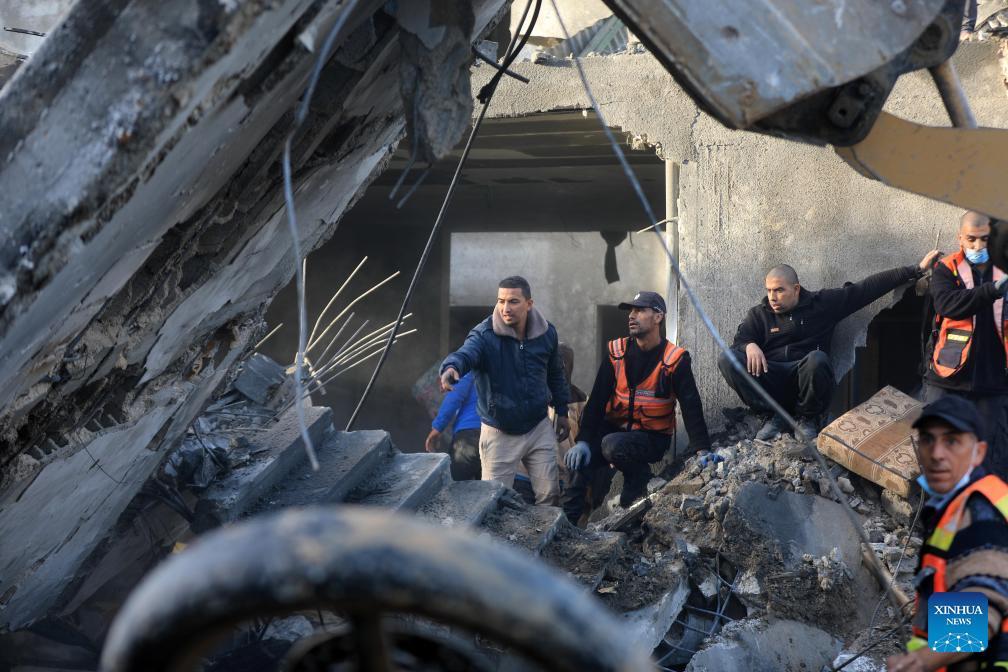Israeli attacks continue in Gaza as truce postponed
 0 Comment(s)
0 Comment(s) Print
Print E-mail Xinhua, November 24, 2023
E-mail Xinhua, November 24, 2023

People conduct rescue work among the rubble of a building destroyed in an Israeli strike in the southern Gaza Strip city of Khan Younis, on Nov. 23, 2023. [Photo/Xinhua]
Israel continued its attacks in the Gaza Strip on Thursday morning since the ceasefire deal reached between the country and the Gaza-ruling Hamas movement did not, as expected, come into effect on Thursday.
The deal on a four-day temporary ceasefire in Gaza for a swap of at least 50 hostages kidnapped in Gaza and some 150 Palestinian detainees held in Israel, as well as for more humanitarian aid to enter the war-stricken Palestinian enclave, was initially agreed by the two warring parties on Wednesday and is due to take effect on Thursday.
However, in an announcement late Wednesday, Israel's National Security Council Director Tzachi Hanegbi said the Qatari-mediated deal was postponed, while the Israeli strikes were going on overnight in Gaza.
An Israeli army spokesperson reported in a statement that heavy fighting continued in the areas of Jabalia and Beit Hanoun in the northern Gaza Strip, adding that more than 300 sites were struck over the past day.
The Israel Defense Forces (IDF) announced on Thursday afternoon that it had apprehended the director of Gaza's largest Al-Shifa Hospital, Mohammed Abu Selmeia, accusing him of allowing Hamas to exploit the hospital as a command and control center.
On Israeli TV broadcasts, large clouds of black smoke were seen rising above northern Gaza.
The army re-issued a call for residents of Gaza City to evacuate southward. "We address the residents of Gaza City, especially in the neighborhoods of Jabalia and Shuja'iyya, to evacuate immediately for your own safety," the IDF wrote in Arabic on the social media platform X.
IDF Chief of Staff Herzi Halevi met with commanders inside the Gaza Strip to assess the situation on the field. In video footage released by the army, Halevi was heard telling the commanders, "We are not ending the war. We will continue until we are victorious."
The conflict has led to massive destruction in Gaza, including whole neighborhoods razed by Israeli strikes, and the killing of at least 14,532 people, mostly civilians, according to official Palestinian figures. According to Israeli figures, about 1,200 people were killed, and about 240 others were held as hostages during the Hamas attack on southern Israel on Oct. 7 that triggered the conflict.
Amid the persistent fighting, on Thursday afternoon, the mediator Qatar announced that the Gaza truce would officially take effect at 7 a.m. local time (0500 GMT) on Friday.
On the Lebanon front, Hezbollah said in a statement on Wednesday that its fighters fired 48 rockets at Israel, the largest salvo toward Israel since the beginning of its border clashes with Israel.
The rockets triggered air raid sirens throughout the Upper Galilee region in northern Israel.
The Israeli military confirmed in a statement that about 35 rockets, in addition to several anti-tank missiles and mortars, were fired from Lebanon toward various locations in northern Israel.
An unspecified number of the rockets were intercepted by Israel's Iron Dome system, according to the army.
No casualties have been reported but Israel's Fire and Rescue Authority said two anti-tank rockets hit two residential homes in the community of Kibbutz Manara.
Israeli artillery and aircraft struck the area from which the projectiles were fired, as stated by the army. The statement mentioned that one of the launchers was hit by the "Iron Sting," a dual guidance system utilizing both laser and GPS, which was introduced into combat within the past month.
According to figures released by Hezbollah, at least 85 militants have been killed in Israeli strikes in Lebanon since the beginning of the escalation, while a Lebanese military source told Xinhua on Wednesday that a total of 115 people on the Lebanese side had been killed in clashes with Israel.






Go to Forum >>0 Comment(s)